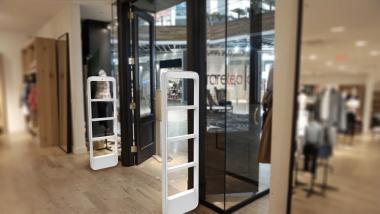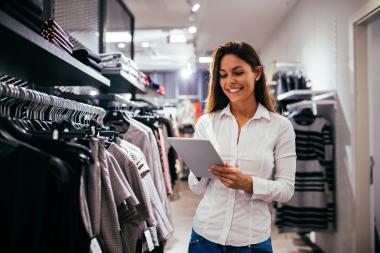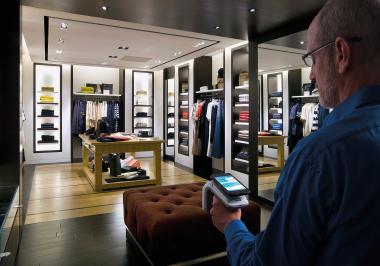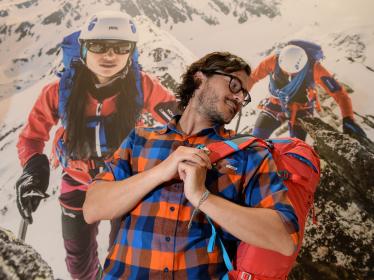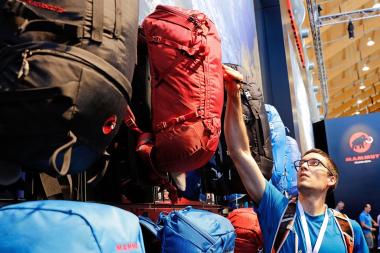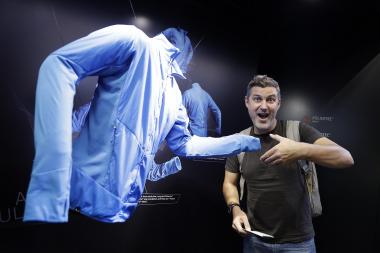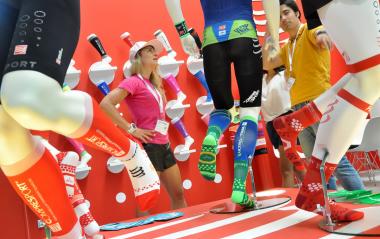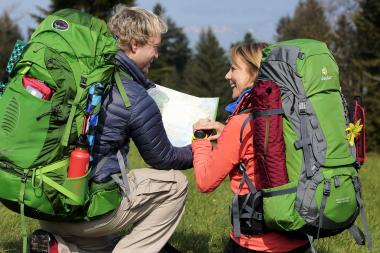Checkpoint Systems: Retail Technology Solutions – Success needs a Team
Checkpoint Systems, a division of CCL Industries, is a global leader in retail solutions. The portfolio ranges from electronic article surveillance as well as theft and loss prevention to RFID hardware and software and labeling solutions. The aim is to provide retailers with accurate, real-time inventory, speed up the replenishment cycle, prevent out-of-stocks and reduce theft to improve product availability and the customer shopping experience.
Textination spoke with Miguel Garcia Manso, Business Unit Director Germany at Checkpoint Systems, where the 44-year-old industrial engineering graduate has been working since 2018. With many years of international retail experience, he knows the needs of the retail industry very well. Before that, Miguel Garcia Manso lived in Madrid for almost 15 years, where he worked for the Spanish food retailer DIA. There he also accompanied the introduction and roll-out of article surveillance projects.
If you had to present Checkpoint Systems and its portfolio to someone who is not a retail professional – what would you say?
We are the retail partner and our job is to help retailers make shopping as pleasant as possible for their customers. Put simply, our solutions ensure that the right product is in the right place at the right time when the end consumer wants to buy it, instead of standing in front of an empty shelf in the worst-case scenario. Our portfolio ranges from individual anti-theft products to solutions that cover the entire supply chain and provide the greatest possible transparency of inventory.
It's been a long journey from the 1960s, when a small team in the U.S. developed a method to prevent the theft of books from public libraries, to becoming the international leader in 21st century article surveillance, operating in 35 countries. What legacy is still important to you today, and how would you describe the spirit at Checkpoint Systems?
Both questions have the same answer: On the one hand, innovative strength and, on the other, consistent exchange with the retail industry. Both have been in the focus at Checkpoint Systems from the very beginning. We develop our products and systems in close exchange with the industry, actively seek dialogue, listen to what is needed in everyday life, etc. This is very important to us and is also regularly used as a selling point for Checkpoint Systems. We definitely want to continue this.
You offer hardware and software technologies for retail, which is a very complex market. How do the requirements of retailers from the fashion, outdoor and textile industries differ from those of other industries?
The reasons why retail companies contact us are similar across all industries. They all want to delight their customers, retain them in the long term, and generate more sales. The ways to achieve this may differ: From omni-channel strategies for the fashion sector, to article surveillance solutions for high-priced electrical or cosmetic products, and to RFID-based fresh food solutions for food retailers to reduce food waste.
The requirements of the industries differ, especially when it comes to labels. Depending on the size and price of the product as well as the desired technology, we recommend different labels – or develop them in close coordination with the customer. For the Polish fashion company LPP, for example, we have just developed a special dual RF and RFID tag that blends harmoniously into the store design.
Magic word RFID – the contactless and automated reading and storing of data based on electromagnetic waves is the centerpiece of your technologies. You even encourage your customers to develop their own RFID strategy. What do you mean by this and are you sure that all retail companies will be able to do this on their own?
We develop the strategy together with our customers, usually as part of a pilot project. Until a few years ago, the introduction of RFID technology was actually more complex and usually involved a project lasting several years. Today, however, we can quickly calculate for each retailer in the context of a small pilot project, how much more profitable they can be with RFID and what their return on investment is. We usually start with a store scan, followed by pilot testing in selected stores, including individual training and on-site support. And by the time it is implemented in all stores, the customers themselves are RFID experts and have an understanding of what they can do with the real-time data.
What does the keyword "customized" mean for Checkpoint Systems? To what extent can you map the individual needs of each customer? Or can you make every retail company – whether chain or boutique – "happy"?
We give high priority to personalized solutions. This concerns, on the one hand, the product itself and, on the other, the size of the company. As you already indicate, large retail chains obviously have different needs than small boutiques. For O₂, Telefónica Germany’s core brand, for example, we have just specially adapted our AutoPeg tags for theft protection. Instead of the standard yellow, the tags for O₂ are white with blue lettering to match the store design.
This also shows the development in the area of article surveillance in general: When article surveillance was still in its infancy, antennas and labels were mainly functional. Nowadays, they blend harmoniously into the overall look of the store design. Retailers no longer have to choose between design and functionality.
How is innovation management practiced in your company and which developments that Checkpoint has worked on recently are you particularly proud of?
In recent months, we have worked intensively – together with the German Employers' Liability Insurance Association (Berufsgenossenschaft Handel und Warenlogistik) – on the testing and certification of our article surveillance systems and now we can proudly say: We are the first manufacturer in Germany whose EAS systems have been tested by the CSA Group, an internationally recognized and accredited provider of testing and certification services. The CSA Group has confirmed that our radio frequency-based EAS systems comply with all standards and guidelines applicable in Germany with regard to exposure to electromagnetic fields. No safety distances need to be maintained.
The background is as follows: Retailers in Germany are obliged to prepare a risk assessment if they use an EAS system. The CE declaration of conformity, which they receive from the manufacturer when purchasing an EAS system, is not sufficient for this purpose. By testing our systems, we have created the best conditions for our customers to make such an assessment. We have also provided the relevant documents to the Employer's Liability Insurance Association.
We are also proud of the fact that we have managed to increase the clearance widths of our NEO antennas for article surveillance from two meters to 2.70 meters. This gives retailers significantly more freedom in store design. In general, store design is also a good keyword at this point: With our free-standing antennas, the design of the NS40 or even the possibility of incorporating antennas into checkout systems, we have contributed a great deal to making article surveillance aesthetically pleasing and harmoniously integrated into the whole.
The Covid-19 period was a disaster, especially for the stationary retail. In recent months, companies have increasingly moved in the direction of e-commerce – whether via individual store solutions or marketplaces – in order to compensate for at least part of the decline in sales. What is your advice to retailers: Can only omni-channel businesses be successful today and in the future?
Yes, that is definitely our advice to retailers. Omni-channel solutions are not going to disappear, but will continue to become more common and will be indispensable in the near future. Retailers are well advised to adapt to this new situation – also regardless of Corona – and to invest in the expansion of functioning omni-channel solutions. Customers expect the product they want, to be available when they enter a store. And if not, that they can easily have it delivered to the same store or shipped to their home. This only works with very high inventory transparency, for example through our RFID solutions.
Keyword: economic efficiency. Creating the much-vaunted personalized perfect shopping experience for the customer costs money, doesn't it? Stock availability, reducing inventories through clearance sales, shelf management, logistics and returns processing – to what extent can you support retailers in increasing their profitability?
NOT creating the perfect shopping experience costs a lot more – dissatisfied customers who haven't found what they want won't come back. To keep up with customer demand, many retailers therefore stock far too much products. In our experience, this amounts to an average of 42,000 items. That costs. These retailers pay high costs for warehouse space, need a lot of time for inventory processes, and end up having to reduce products significantly in order to reduce inventories.
The key to greater profitability lies in inventory accuracy. With the help of RFID technology, we can increase this to up to 99 percent. This allows us to avoid under- or overstocking, reduce the amount of storage space required, and optimize processes, including inventory. RFID can read hundreds of tags simultaneously and is more accurate and faster than manual counting. Experience shows that retailers can increase their sales by an average of three percent with our RFID technology.
Even if the situation in retail has eased to some extent as a result of the vaccinations, the shopping situation in on-site stores – viewed optimistically – also requires special precautions, at least for the next few months. With "safer shopping," you offer a package of various components for this purpose. What does it cover?
SmartOccupancy is our simple solution for controlling the number of people in salesrooms in real time. The system counts the number of people entering and leaving using Visiplus 3D, an overhead people counting sensor. When the maximum capacity is almost reached, SmartOccupancy sends an alert to the staff. This allows the staff to respond to current occupancy counts in real time, contributing to a safer environment for employees and customers. Those responsible can use SmartOccupancy to implement official instructions on the maximum number of people safely and reliably; manual counting is no longer necessary. A visual capacity indicator clearly shows customers at the door whether they are allowed to enter the store or not.
The second solution is primarily of interest to the textile and clothing industry as well as the footwear market: Inventory Quarantine is a software solution for secure, automated returns (SaaS-based). It allows retailers to park returned goods in an automated quarantine queue for a few hours. After the pre-defined time has passed, Inventory Quarantine notifies employees via push message that the piece of clothing or shoe can be cleared back to the floor or re-tagged as available in the online store. This means that items are only released when they are deemed safe for resale – while ensuring that items are put back on sale promptly. The solution helps retailers keep track of returned goods and minimize the time when products are not available on sale.
"Ethical consumption has finally become an attitude and has arrived in the middle of society," trend researcher Peter Wippermann commented on the results of the Otto Group's latest trend study "Living More Consciously". What does sustainability mean to Checkpoint Systems as a company, how do you reflect this finding in your product portfolio and how do you support your customers in achieving sustainability goals?
Sustainability is definitely an important topic for us at Checkpoint Systems. We regularly review our products and processes to see how we can work even more resource-efficiently, reduce production waste and lower our CO2 emissions. This also includes, how we can further reduce the power consumption of our antennas. We only develop and sell RF antennas. This technology is not only safer in terms of exposure to electromagnetic fields, but also more environmentally friendly: RF antennas require 40 to 70 percent less energy than other technologies.
The Interview was conducted by Ines Chucholowius, Managing Partner, Textination GmbH.


